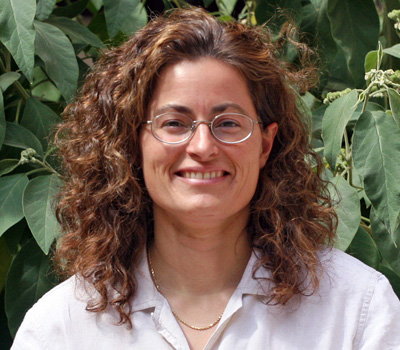Dr. Miranda is creating well-tolerated, nontoxic drugs that target many diseases
Disease often develops as a function of being exposed to too much or too little of a certain compound. This chemical could be from the external environment, could be a nutrient in food, or could be produced in the body. When air, which is primarily nitrogen and oxygen, is exposed to unusual conditions such as a lightening storm or hot automobile engines, air reacts to a very small extent to form nitrogen oxides. The levels of these species can accumulate over time such that they become a concern as pollutants. Much lower, nontoxic levels of these same species are made deliberately for example by our cardiovascular and immune systems. Even at these very low levels, when compounds are made in the wrong amount or in the wrong place or time, they can lead to disease. Dr. Katrina Miranda, of the University of Arizona, is interested in understanding the chemistry of disease so that researchers can then find ways to chemically treat disease. Her unique expertise is on studying nitrogen oxides. She studies the chemical changes that these species cause under both normal and disease conditions including chronic pain, heart failure, strokes, and heart attacks in addition to utilizing this information to develop anticancer drugs and therefore presents a new direction of understanding disease processes and treatment.
Dr. Miranda's current focus is on the treatment of breast cancer. Her interest in breast cancer stems from her training at the NIH where she worked with breast cancer patients who were undergoing radiation therapy. While recent improvements in detection and treatment were improving survival rates overall, the individual women who were enrolled in clinical trials at NIH typically had poor prognoses. The targeted therapies that are having positive effects now were only just becoming available at the time. This is when Dr. Miranda became compelled to find solutions for treating difficult cancers. She is interested in making an impact in human health by either discovering a target molecule that other researchers employ in drug development or in creating such a drug herself. For this reason, she works to promote health and envisions a future where treatments for cancer are more successful.
Current Research Includes:
-
Fundamental Chemistry: Dr. Miranda's research is focused upon nitrogen oxides. She and her team are interested in understanding their biological chemistry to determine what these natural species do and what their targets are. In doing so, Dr. Miranda is better able to understand how diseases develop and how to treat them.
-
Detection: Nitrogen oxides are developed at low levels and are quite reactive. Therefore, it can be hard to determine when, where, and how much of these compounds are being made. Dr. Miranda provides methods for such detection, which in turn leads to creating effective treatments.
-
Making Compounds: Dr. Miranda hopes to make compounds that can modulate for disease treatment. Therefore, she seeks to understand what biological modifications occur in order to create tools and drugs for treatment.
- Targeting Breast Cancer: Dr. Miranda hopes to find treatments for cancer, and specifically, breast cancer through the creation of new compounds. In addition, she and her team are working to convert estrogen receptor negative cells back to estrogen receptor positive. By changing the phenotypes of cancer cells, patients with cancer may be more receptive to existing treatments.
Bio
Science grabbed Dr. Miranda's attention early in life, in large part because of her science teacher in elementary school. In high school, science classes were among her favorites, but chemistry in particular opened up a world of possibilities for Dr. Miranda. Therefore, majoring in chemistry and then moving on to graduate school were natural progressions for her. She was lucky to have a number of influential teachers throughout her life, which may have led to her significant interest in teaching. In college and graduate school, Dr. Miranda became enamored with the idea of being able to both teach and conduct research in a university setting. Her Ph.D. and postdoctoral advisors were integral to the process that eventually brought her to the University of Arizona to begin her independent career as an academic researcher.
Dr. Miranda has been involved in sports her whole life. Perhaps her favorite sport is ultimate frisbee which she started playing while in graduate school. Aside from sports, Dr. Miranda also enjoys bird watching, hiking, gardening, and reading.
Website: http://www.cbc.arizona.edu/miranda


